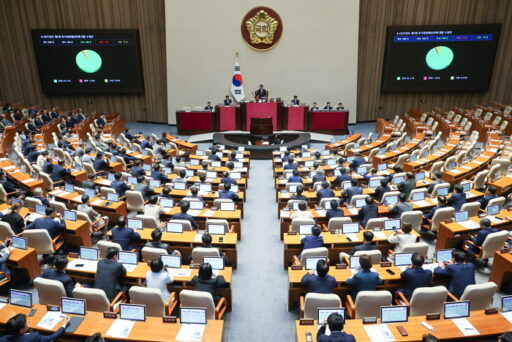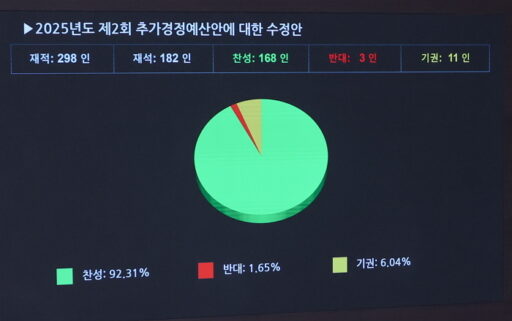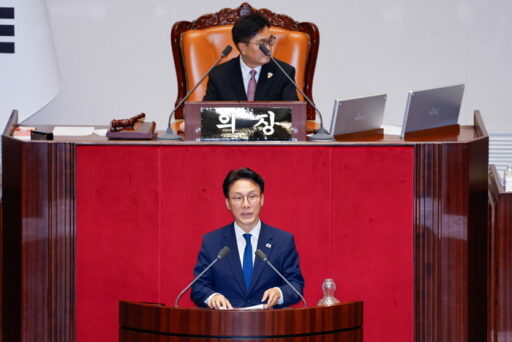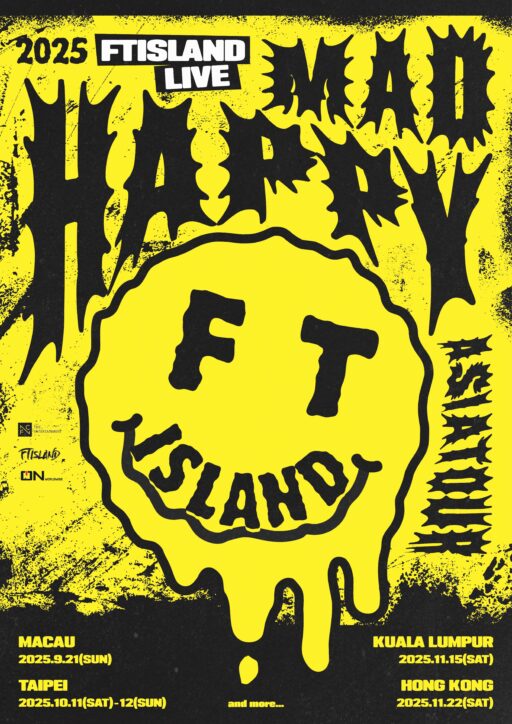31.8 trillion won supplementary budget approved, led by the ruling party
On the 4th, the first supplementary budget proposal of the Yoon Suk-yeol administration, amounting to 31.8 trillion won, was passed in the National Assembly. This supplementary budget, spearheaded by the Democratic Party of Korea, is the second of the year, and was overwhelmingly approved with 168 votes in favor, 3 against, and 11 abstentions from a total of 182 lawmakers present at the National Assembly plenary session.
168 votes in favor, 3 against, 11 abstentions
The People Power Party staged a mass walkout after only conducting opposition debates by Rep. Park Soo-min in protest of the Democratic Party's increase in special activity fees (special expenses) and delays in the plenary session. This supplementary budget proposal was processed 11 days after the government submitted it to the National Assembly with a size of 30.5 trillion won on the 23rd of last month and 8 days after President Yoon's policy speech.
During the review process, a total of 2.4 trillion won was added, including an increase in the government subsidy ratio for consumer recovery coupons and increased support for non-metropolitan and population-declining areas, while 1.1 trillion won was reduced through adjustments to fund projects and official development assistance (ODA) projects.

Expansion of consumer coupon support and controversy over special expenses
The key project of the supplementary budget, the consumer coupon program, was originally set at 10.3 trillion won and was increased by 1.9 trillion won.
To alleviate the burden on local governments, the national government subsidy ratio for Seoul was raised by 5 percentage points to 75%, while other local governments increased by 10 percentage points to 90%. In particular, non-metropolitan and rural areas experiencing population decline will receive an additional benefit of 30,000 won compared to the government's initial plan.
A contentious issue in this supplementary budget was the increase of 10.5 billion won in special expenses for four agencies: the Office of the President, the Ministry of Justice, the Board of Audit and Inspection, and the National Police Agency. Particularly, concerns were raised within the Democratic Party, which is promoting judicial reform, about the special expenses for the prosecution, leading to further discussions in the party's general assembly.

Ultimately, it was agreed to approve a modified supplementary budget with the caveat that "the Ministry of Justice will execute the prosecution’s special expenses after completing legislative reform related to the prosecution."
The Democratic Party asserted that even if the special expenses for the prosecution were restored, they would be subject to parliamentary oversight through verification procedures.
In addition, funding for the zero-emission vehicle supply expansion program was increased by 1.05 trillion won from 1.14 trillion won, and 113.1 billion won was additionally allocated for the infant and toddler care support program.
Rep. Park Soo-min of the People Power Party stated in the opposition debate, "President Yoon Suk-yeol has a history of unilaterally cutting the presidential special expenses during his administration," urging, "I ask the President, as the head of state, commander-in-chief, and head of the executive branch, to apologize to the people for this mistake."

National Assembly Speaker Woo Won-sik emphasized before adjourning the session the need for special care in the execution of special expenses, urging the government to strictly adhere to execution guidelines to enhance transparency.
On the morning of the 5th, the government planned to approve the supplementary budget that had passed, and subsequently, relevant departments would jointly brief on the consumer coupon disbursement plan.
Consumer coupons will be advanced in the first round within this month, with plans to provide an additional 100,000 won to 90% of the populace within two months.
Image source: The 426th National Assembly (extraordinary session) 5th plenary session, held on the afternoon of the 4th in Yeouido, Seoul, where the 2025 supplementary budget was passed with a total of 298 registered members, 182 present, 168 in favor, 3 against, and 11 abstentions. July 4, 2025/News1; Prime Minister Kim Min-seok made remarks regarding the passage of the 2025 supplementary budget at the 426th National Assembly (extraordinary session) 5th plenary session held on the afternoon of July 4, 2025, in Yeouido, Seoul. July 4, 2025/News1.


